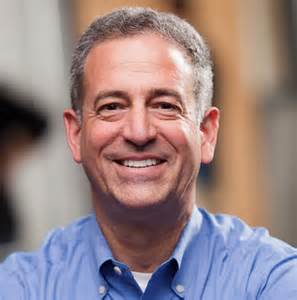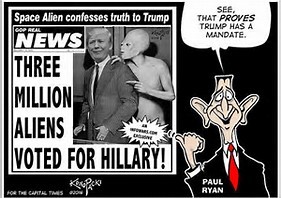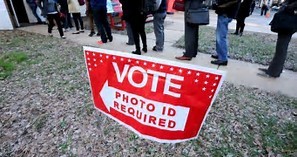Voting Rights and Wrongs, from White House to Wisconsin
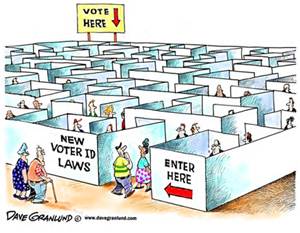
“In a democracy, there is one right that stands atop all the rest: the right to vote.”
–Russ Feingold, the former Senator from Wisconsin
Trump’s Bogus Voting Commission
Right after he fired FBI Director James Comey, Donald Trump needed some kind of diversion to keep people’s minds off of the Russian collusion investigation (how’s that working for you, Donald?). And so he announced the creation of a “voting integrity commission” that would investigate the thoroughly debunked Republican claim of widespread “voter fraud.” As a bonus, perhaps Trump though he could shed doubt on the fact that his popular vote loss was by the largest margin in US history.
His choices to lead the commission probably wouldn’t surprise folks still gaping over Trump’s bizarre cabinet selections. The supposed “bi-partisan” commission would be headed up by Trump’s second-in-command, Mike Pence. Is this the same Mike Pence who, as governor of Indiana, staged that October 2016 raid on the offices of a non-profit organization who was registering low-income and minority voters, “confiscating tens of thousands of voter registration forms” over ten forms suspected of being improperly filled out? Yeah, that’s the guy.
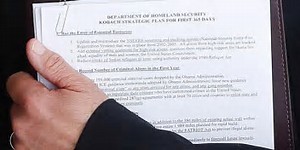
Read closely if you can: Kris Kobach photographed carrying a memo before his meeting with Trump that advocated as close to a Muslim Registry as you can get. A court has ordered him to surrender the document.
Trump’s other choice for the commission was the notorious Kris Kobach. As Kansas secretary of state, Kobach championed a law that forced Kansans to come up with proof-of-citizenship documents when registering to vote, a burdensome task for anyone. The law suspended one in seven new voter registrations, even though Kobach ended up successfully prosecuting just one non-citizen voter. The courts later nullified the law.
Voter Suppression in Wisconsin
If this Trump voting commission had any integrity whatsoever, it would focus its investigation on certain Republican endeavors to erect roadblocks to exercising our most basic democratic right. They don’t even try to hide their intentions anymore. Voter ID laws, voting list purges, ending early voting and same-day registration, felon disenfranchisement, election day intimidation…all are aimed at keeping the “other guys” from voting. Some legacy for the Republican Party: they make it harder for people to vote.
A study released by Priorities USA indicates that Wisconsin’s strict voter ID laws kept up to 200,000 people from the voting booth in 2016. The number is important because Donald Trump won Wisconsin’s electoral votes by a mere 22, 748 vote margin.
The study was based on comparing turnout in states that adopted strict voter ID laws between 2012 and 2016, and states that did not. Here are the basics in a nutshell:
While states with no change in voter identification laws witnessed an average increased turnout of +1.3% from 2012 to 2016, Wisconsin’s turnout (where voter ID laws changed to strict) dropped by -3.3%. If turnout had instead increased by the national no-change average, we estimate that over 200,000 voters would have voted in Wisconsin in 2016.
Further, the Priorities USA study compared turnout in Wisconsin to Minnesota, a state with similar demographics but with no voter ID law. Survey said:
Turnout in African-American counties [in Wisconsin] dropped off at significantly higher levels than in their Minnesota counterparts.
It has to be pointed out that voter ID laws could not have been the only factor in Wisconsin’s voting patterns. Down-ballot races, unique messaging, candidate appearances, no African-American heading the ballot, even the weather…each or all could have played a role.
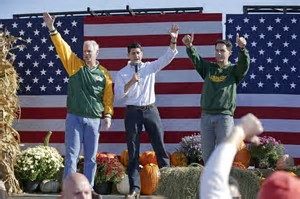
THE THREE STOOGES: Wisconsin’s Republican senator, speaker and governor. Robert La Follette must be spinning in his grave.
Fighting Back at the Grassroots
In Wisconsin, a land of paradoxes that gave us both progressive pioneer Senator Robert La Follette, Jr. and Senator Joe McCarthy, resistance to voter suppression is coming from both Democratic leadership and grassroots organizations.
I found one such organization courtesy of my friend Kenneth Wald, now a retired high school principal. His Milwaukee Riverwest neighborhood is a diverse community that lies west of the Milwaukee River. They formed a group, Riverwest Votes, whose membership is “a politically active and progressive group of citizens…who are organizing residents of our community to vote. We are seeking Block Leaders to inform and urge our neighbors to join us.” The Riverwest Vote Facebook group has grown to 1,077 members.
Feingold Proposes a National Voting Rights Act
After almost a century of Jim Crow laws, The Voting Rights Acts of 1965 and 1966 enshrined the right to vote for Americans of all races. The Supreme Court in 2013 stuck down a key component of that law, the one that required some states to get permission from the Justice Department before changing their voting laws. Immediately after the ruling (some the day after), states with Republican governance rushed to enact voter suppression laws, with features described above.
Former Wisconsin Senator Russ Feingold, writing in Vox, proposed a once-and-for-all solution:
Our democratic legitimacy will be determined by how we respond, as a country, to the growing assault on voting rights. The successful suppression of a single vote is an assault on the citizenry as a whole; it’s an attempt to shift power away from the people and to a specific elite class. W cannot stand back and rely on our courts to challenge very new voter suppression law. This could be our generation’s civil right movement, our 1965, and we must rise to meet it. We need a 21st century Voting Rights Act. The onus is on us to demand one, and on Congress to pass it.
There’s not s snowball’s chance that this Congress will pass one. But let’s make it an issue in the 2018 Congressional elections, win back the House and get a bill passed.
Then we can level the playing field…once and for all.
